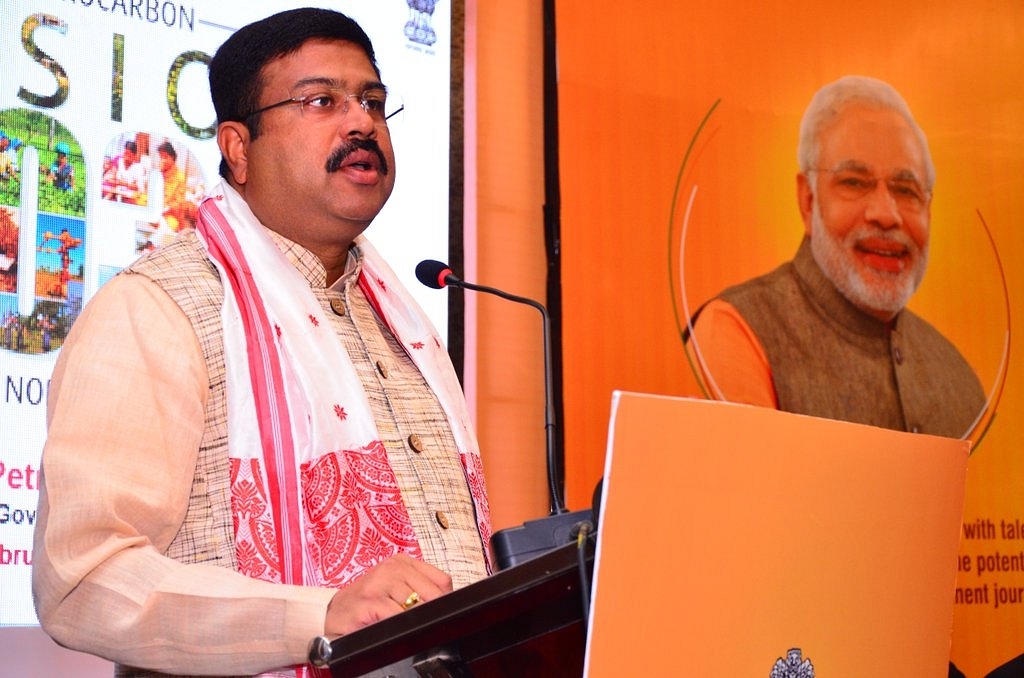Economy
New Oil Exploration Policy Is True Market-Based Reform; Dharmendra Pradhan Has Earned His Reform Stripes
- Dharmendra Pradhan’s hydrocarbon licensing policy is a big shift from the profit share-based bidding process.
- Revenue-sharing is intrinsically easier to define and capture than profit share, since profit share needs you to calculate both variable and investment costs, often leading to gold-plating of projects by contractors since this enables them to postpone sharing of profits with government
- Pradhan is the unlikely reformer who deserves kudos for this reform.

Dharmendra Pradhan
This is reform. Real reform. The NDA government’s announcement of a new Hydrocarbon Exploration and Licensing Police (HELP), which replaces the controversy-ridden NELP, is likely to go down as one of its biggest market-oriented reforms to date, possibly as big as the New Telecom Policy of NDA-1, which launched the telecom revolution. The stage has been set to increase oil, gas and coal-bed methane products in the coming years dramatically.
The key features of HELP, drafted under the stewardship of Petroleum Minister Dharmendra Pradhan, are that there will be one single licensing policy for all kinds of hydrocarbon (oil, gas, coal-bed methane, shale), market-based pricing for hydrocarbon produced in deep water, ultra deep water, and high pressure temperature areas (that is, places where exploration and production are difficult), and, most importantly, offer licensees bidding based on revenue-sharing instead of profit sharing.
With this policy, Pradhan has emerged as one of the unexpected reform icons in the Modi government, after stewarding diesel price decontrol and shifting LPG subsidies to direct benefit transfers. Next on his list could be kerosene, for which pilot projects are underway.
Pradhan’s hydrocarbon licensing policy is a big shift from the profit share-based bidding process under the previous New Exploration and Licensing Policy (NELP) that resulted in endless wrangles, heartburn and arbitration involving Reliance Industries’ gasfields in the Krishna-Godavari (KG) offshore areas, among other things.
Revenue-sharing is intrinsically easier to define and capture for both parties than profit share, since profit share needs you to calculate both variable and investment costs, often leading to gold-plating of projects by contractors since this enables them to postpone sharing of profits with government. If costs are inflated, the profit share date get pushed back for the government as profits can be made only after full investment and variable costs are recovered.
But before Arvind Kejriwal rushes in to say that this was intended to benefit Reliance Industries, the policy explicitly states that HELP will apply only to new offshore oilfield projects that are yet to start commercial production as on 1 January 2016. Reliance can benefit only from bidding in new fields, and it has to win those bids in the first place.
In short, it is about future projects, and not current ones.
However, the marketing and pricing freedom indicated by the new policy is not total, and the government has put in a ceiling based on the landed cost of imported fuels. The ceiling price to be announced by the government will be the lowest among three prices – the landed price of fuel oil, the weighted average landed price of substitute fuels such as fuel oil, coal and naphtha, and the landed price of imported liquefied natural gas (LNG).
But this ceiling is generous enough to pass off as market-based pricing since the market price would anyway have been limited by the price at which one can make imports. What this formula does is limit the contractors’ ability to use kinks in an imperfect market to make large price increases. A transparently calculated ceiling price will not be too intrusive an intervention by government in market trends. It leaves ample room for discovering a true balance between demand and supply in the home market.
Another innovation introduced in HELP is the opening up of the entire Indian exploration acreage for investment instead of offering blocks bit by bit. Under the new “open acreage licensing policy”, anyone can bid for any area to explore, but the actual licence will be given only on the basis of competitive bidding. In revenue-share bids, the winner will be the party offering the highest net present value of future revenue shares over the expected life of a hydrocarbon field.
In order to encourage exploration, the government is also offering a concessional royalty scheme – which will be zero for deep water and ultra-deep water areas for seven years, and then go up to 5 percent and 2 percent for the two kinds of fields respectively. For shallow water areas, the royalty rates are down from 10 percent to 7.5 percent.
After dilly-dallying for nearly two years, the NDA government has finally bitten into real reform. Dharmendra Pradhan is the unlikely reformer who deserves kudos for this achievement.
Introducing ElectionsHQ + 50 Ground Reports Project
The 2024 elections might seem easy to guess, but there are some important questions that shouldn't be missed.
Do freebies still sway voters? Do people prioritise infrastructure when voting? How will Punjab vote?
The answers to these questions provide great insights into where we, as a country, are headed in the years to come.
Swarajya is starting a project with an aim to do 50 solid ground stories and a smart commentary service on WhatsApp, a one-of-a-kind. We'd love your support during this election season.
Click below to contribute.
Latest